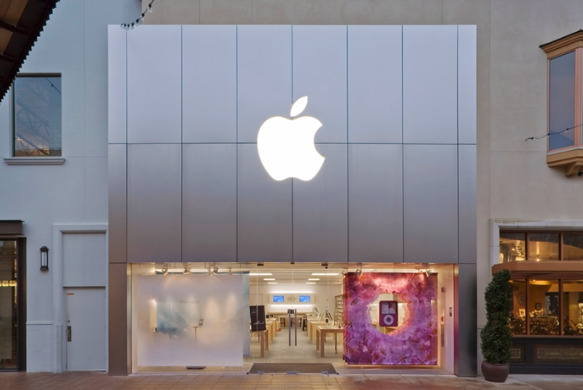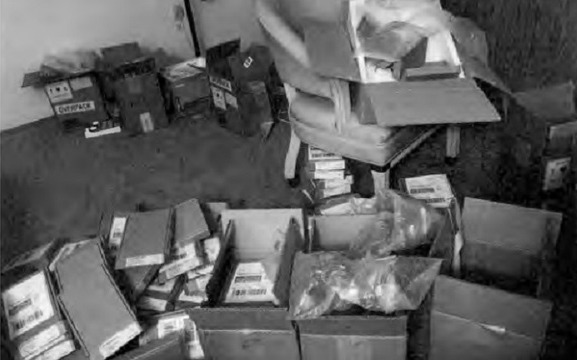Feds bust $900,000 iPhone repair & return scam in Oregon
Two engineering students in Oregon are accused of bringing thousands of counterfeit iPhones to Apple and having them replaced with real ones that they then shipped to China for sale.

Apple's Bridgeport Village Store, Oregon. Some of the alleged fraud was perpetuated online but others involved visits to Oregon's three Apple Stores
Students Yangyang Zhou and Quan Jiang, both Chinese nationals studying in Oregon, are accused of getting Apple to replace their counterfeit iPhones with real ones. Each iPhone was replaced under Apple's repair policies and the thousands of phones were then sent to China where they were sold. Apple reportedly estimates the cost of the fraud to be $895,800.
Zhou made his first court appearance at the US District Court in Portland on Friday where federal investigators from Customs and Border Protection (CBP) claimed that he and Jiang had received multiple shipments of counterfeit iPhones from China.

Boxes of fake iPhones found at suspects' homes. Source: US Attorney's Office via KION
An Apple representative explained to the court how the fraud worked.
"Submission of an iPhone that will not power on is critical to perpetuating iPhone warranty fraud," said the representative, "As the phone will not be able to be immediately examined or repaired by Apple technicians, triggering the Apple phone replacement process as part of its product warranty."
According to court records as reported by The Oregonian newspaper, Apple received more than 3,000 warranty claims from Jiang and in 1,493 cases replaced his phone.
Customs and Border Protection officials began investigating in April 2017 after having seized five or more shipments of phones. In December 2017, Homeland Security interviewed Jiang who admitted regularly receiving 20 to 30 "iPhones" from China.
At the time of the alleged fraud, Zhou and Jiang were both living in Corvallis, Oregon, and were on student visas to study engineering. Jiang was studying at Linn Benton Community College and Zhou at Oregon State University.
Apple reportedly sent Jiang a cease-and-desist letter in both June and July 2017 while CBP also wrote in April and October to tell him that counterfeit phones addressed to him had been seized. Jiang denies receiving any of these letters or being told that what he was doing was illegal.
Jiang's defense lawyer has so far declined to comment but Zhou's told Portland's KOIN that his client is innocent. "Mr Zhou was not aware of any alleged counterfeiting," he said, " and we believe Mr Zhou will be vindicated."
Apple has yet to comment publicly on this case but reportedly it has been working to combat similar fraud cases for at least the last six years.

Apple's Bridgeport Village Store, Oregon. Some of the alleged fraud was perpetuated online but others involved visits to Oregon's three Apple Stores
Students Yangyang Zhou and Quan Jiang, both Chinese nationals studying in Oregon, are accused of getting Apple to replace their counterfeit iPhones with real ones. Each iPhone was replaced under Apple's repair policies and the thousands of phones were then sent to China where they were sold. Apple reportedly estimates the cost of the fraud to be $895,800.
Zhou made his first court appearance at the US District Court in Portland on Friday where federal investigators from Customs and Border Protection (CBP) claimed that he and Jiang had received multiple shipments of counterfeit iPhones from China.

Boxes of fake iPhones found at suspects' homes. Source: US Attorney's Office via KION
An Apple representative explained to the court how the fraud worked.
"Submission of an iPhone that will not power on is critical to perpetuating iPhone warranty fraud," said the representative, "As the phone will not be able to be immediately examined or repaired by Apple technicians, triggering the Apple phone replacement process as part of its product warranty."
According to court records as reported by The Oregonian newspaper, Apple received more than 3,000 warranty claims from Jiang and in 1,493 cases replaced his phone.
Customs and Border Protection officials began investigating in April 2017 after having seized five or more shipments of phones. In December 2017, Homeland Security interviewed Jiang who admitted regularly receiving 20 to 30 "iPhones" from China.
At the time of the alleged fraud, Zhou and Jiang were both living in Corvallis, Oregon, and were on student visas to study engineering. Jiang was studying at Linn Benton Community College and Zhou at Oregon State University.
Apple reportedly sent Jiang a cease-and-desist letter in both June and July 2017 while CBP also wrote in April and October to tell him that counterfeit phones addressed to him had been seized. Jiang denies receiving any of these letters or being told that what he was doing was illegal.
Jiang's defense lawyer has so far declined to comment but Zhou's told Portland's KOIN that his client is innocent. "Mr Zhou was not aware of any alleged counterfeiting," he said, " and we believe Mr Zhou will be vindicated."
Apple has yet to comment publicly on this case but reportedly it has been working to combat similar fraud cases for at least the last six years.

Comments
95% or more crooks arrested deny guilt as a matter of course, not matter how blatant they're guilt. 'It wasn't me. Maybe it was somebody who looked like me. But it wasn't me. You gonna believe me or your lyin' eyes. No that's not my gun/weed/crack. I found it and was going to turn it in to the police.'
It's extremely rare for a crook to hold out his hands and say 'Ya got me. I did it. Put the cuffs on'. Does anybody really expect an admission of guilt, prior to a plea bargain? Only an idiot would.
Well, don't they bear a large part of the responsibility? Fool me once, shame on you. Fool me twice...
When banks or other major corporations are hacked, and it's revealed that they stored data unencrypted, failing to take some basic security precautions, do you say they have no responsibility, culpability, or liability? It was the hackers!
Apple got suspicious. Eventually. Somebody, somewhere at Apple should have seen this earlier. There were three Apple stores involved, but seriously... I can't use the same discount code twice without it being caught. Not that I would ever try that.
Seriously, as Dr. S asked, how did it ever get that far? I don't think it was inside help at all. There would be no need to try multiple stores. That the phones didn't work was indeed the key, but you have do wonder didn't somebody somewhere say 'What, you—again??' We don't know that anybody ever did, as this may have been caught be some 'lowly' bean counter.